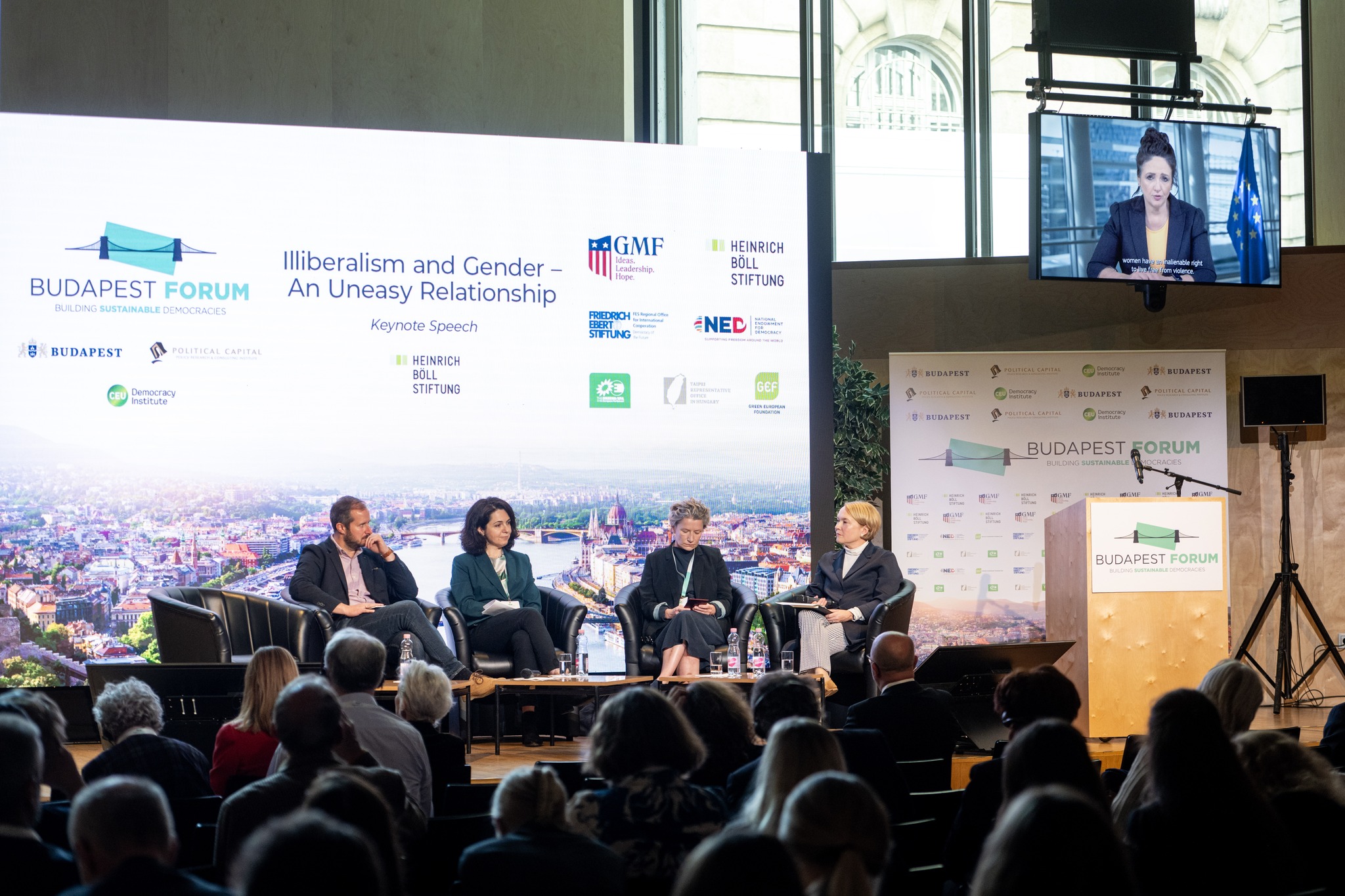Budapest Forum 2023 - Illiberalism and Gender – An Uneasy Relationship
2023-10-19
Speakers
- Magdalena Grabowska, Associated Professor, Institute of Philosophy and Sociology, Polish Academy of Sciences
- Dénes Krusovszky, Poet, Critic, Translator
- Réka Sáfrány, Chairwoman at Hungarian Women’s Lobby
Moderator: Eva van re Rakt, Head of the Division EU/North America, Heinrich Böll Stiftung Berlin

Main takeaways
- There is a clear link between illiberalism and anti-gender politics. Gender scholars describe different anti-gender manifestations in Central-Eastern-Europe from opposition to gender via gender policy backsliding to state anti-feminism.
- The term “opportunistic synergy” means a dynamic that allows forming political alliances between political actors that do not always have that much in common. The synergy allows for a large scale of elite exchange in various fields of social life, including government, academia, culture and civil society. This is what is happening right now in Poland - the takeover of the state. Several strategies were used to reposition right-wing actors as legitimate actors at the international and national levels. These are the strategies that they circulate transnationally - the reversal strategy that consists of reclaiming the victim status by the oppressed majority, appropriation of human rights language, smear campaigns against individuals and institutions, and the strategy of legitimation pushing the right-wing and radical nationalistic agenda into the political mainstream.
- Poland is an example of democratic backsliding or de-democratization with its illiberal democracy or electoral autocracy. At the same time, Poland is also a scene for the revival of the grassroots pro-participatory democracy movements, including or led by women’s or feminist movements, who recently were able to mobilize the masses against the further restrictions of abortion law. The fate of democracy and gender equality is to be decided in the upcoming elections in Poland.
- The transition period when Poland’s consolidated democracy turned into an illiberal democracy coincided with the severe restriction of women’s rights, particularly abortion law, and the model of formal liberal democracy was chosen over the participatory model promised by the solidarity model over the 1980s. The newest wave of anti-gender politics is dated from 2012 and the opposition to the Istanbul Convention. The actions of anti-gender actors are often represented as a protest against the hegemony of formal democracy. Since 2012 in Poland, gender mainstreaming and the Istanbul Convention have been framed as contradictory to traditional family values. While in the first phase of gender backlash, the focus was on the abstract category of gender or gender ideology, after 2015 they targeted specific groups representing state- or institutional homophobia and transphobia.
- In Hungary, choosing and picking the concept of gender was a conscious choice of the Hungarian government as a pseudo-conservative argument which can bring together different voters. It was possible to observe how this anti-gender approach entered Hungary. Gender as a term was demonised and pictured as an opposition to traditional families.
- This is also a language-related issue in Hungary: the government has occupied the phrase, and when we try to speak about it, we feel that we have to defend ourselves and explain the frame. The government’s key approach is to simplify the term “gender” to “the mother is a woman, the father is a man”, as it has been in the Hungarian Constitution since 2020, not dealing with the fact that the term “gender” covers constantly changing roles.
- Even though the populist conservative views are widely spread by the governments in both Poland and Hungary, there are parallel movements. In Hungary, the support of same-sex marriage has increased over the past years many young people seem to be more receptive to the idea of equality. In Poland, many young people have been engaged in women’s and climate protests and don’t feel represented in politics. They either do not vote, or they vote divided by gender.
- In Poland, there is a transformation from reacting to being proactive. Participatory democracy movements were able to set values in society, such as solidarity, care, social justice, and empathy. They were also able to switch to a social change, for example, by making the topic of women’s rights and gender unavoidable in rhetoric.
- Hungary as a country is polarised; thus, the resistance against the illiberal agenda has to be built bottom-up, and most of all, solidarity is needed, which is a society lacking now. Even though successful mobilisations and alliances were formed, the whole picture is dull, and organisations need support.
- We can reclaim democracy by emphasising what is happening in the margins of the country and supporting everyday/practical activism dealing with the problems of small communities, giving space for different movements. The focus needs to be switched to the importance of care.
- It is important to build alliances with politics, e.g. with municipalities. Also, it is important to have gender equality on the agenda in parties’ platforms on the EU level. Besides the gender equality strategy and the instruments introduced, monitoring should also be done.
- On the EU level, there is a need for a Care Deal, which deals with how and by whom care is carried out.
Policy recommendations
- To reclaim democracy, it is important to put local issues in the focus, listen to the problems raised by local/practical activism, and give space to different (local) movements.
- Politicians and parties on all levels should have gender equality on their agenda.
- There is a need for a Care Deal on the EU level, which deals with how and by whom care is carried out.
Copyright 2025. Political Capital Policy Research and Consulting Institute, all rights reserved.

